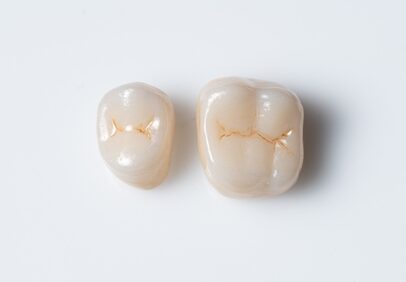Dental Crowns in Dallas, TX
Dental crowns, or caps, address many different oral health problems. Their primary purpose is to protect and restore damaged or missing teeth. They can be used in various restorative and cosmetic situations, either by themselves or along with other procedures. In fact, dental crowns are so versatile that they are the most widely used restorative procedure in today’s dental offices.
Crowns are a simple yet effective method for treating damaged teeth or replacing missing ones. Acting as a protective barrier, they also prevent additional problems from developing. Not addressing a damaged or missing tooth increases the risk of future oral health issues. For instance, an untreated, damaged tooth can be a source of constant pain and may cause gum disease or tooth loss. Additionally, the empty socket of a missing tooth can breed infection, impact your ability to eat certain foods, and make it difficult to speak clearly. Dental crowns can solve all of these problems and more.
What Is a Dental Crown?
 A dental crown is a custom-fitted protective covering that fits around a vulnerable tooth, preventing further damage and restoring the tooth to its original quality. They are made from various materials, including metal and porcelain. The material you choose will depend on your budget and preferences. When properly maintained, a dental crown can last fifteen years or more.
A dental crown is a custom-fitted protective covering that fits around a vulnerable tooth, preventing further damage and restoring the tooth to its original quality. They are made from various materials, including metal and porcelain. The material you choose will depend on your budget and preferences. When properly maintained, a dental crown can last fifteen years or more.
However, placing a crown doesn’t mean your tooth is suddenly invincible. The remaining tooth under the crown and the surrounding gum tissue can still decay or become infected, especially if the crown gets damaged. Proper dental hygiene and regular visits to Bent Tree Dental are essential to maintain good oral health.
What Do Dental Crowns Do?
Crowns are primarily a restorative procedure, meaning they bring back your tooth’s strength and structure. However, tooth-colored crowns have additional cosmetic benefits that can enhance a patient’s smile while restoring functionality. These crowns can conceal discolored or misshapen teeth and provide extra protection.
While a traditional crown fits over a damaged tooth, an artificial crown can also attach to a dental implant to replace a missing tooth following tooth loss or extraction. If multiple teeth are missing, crowns can anchor a dental bridge. Dr. Miller may also use a crown after root canal therapy to protect the newly disinfected tooth.
The versatility of crowns is one of their strengths. But all of these different procedures have the same goal: restoring functionality and enhancing the aesthetics of the area of the mouth needing treatment.
Types of Dental Crowns
Dental crowns can be made from different materials to suit each patient’s unique needs and preferences. Common materials include:
- Metal crowns: Metals used include gold, nickel, palladium, and chromium. Metal crowns are the most durable option and require minimal enamel removal. While very long-lasting, they are easy to spot in the mouth.
- Porcelain-fused-to-metal crowns: Also known as PFM crowns, this option is both durable and natural looking. We can match the porcelain exterior to the natural shade of your teeth. However, the porcelain may wear over time, revealing the metal structure beneath.
- All-ceramic or all-porcelain crowns: The closest option to the look of natural teeth, these can be made of various materials, including zirconia, the strongest tooth replacement material available.
At your appointment, we will help you determine the best type of crown for your needs.
The Dental Crown Process
Because crowns can be used in many circumstances, not every procedure looks the same. For example, the procedure for a tooth-colored crown will differ from that of a mini implant-supported crown. However, each procedure typically includes a free consultation, preparation, and placement.
Consultation
When considering any procedure, the first step is to schedule a consultation with Dr. Miller. During this first visit, Dr. Miller will examine your teeth, take digital 3D X-rays, and review your oral history. This information helps Dr. Miller evaluate your needs and begin treatment planning. If a crown is right for you, he will craft a personalized plan tailored to your preferences and concerns.
Dental Crown Preparation
 Whether you need a standard dental crown or an implant-supported crown, Dr. Miller has the experience and resources to restore your smile. For those needing a traditional crown or bridge, Dr. Miller will begin by preparing the tooth or teeth.
Whether you need a standard dental crown or an implant-supported crown, Dr. Miller has the experience and resources to restore your smile. For those needing a traditional crown or bridge, Dr. Miller will begin by preparing the tooth or teeth.
Because a crown is most effective when it fits perfectly, Dr. Miller will precisely shape the tooth enamel to accommodate the crown. Just as a skilled contractor measures and plans everything carefully so the finished product looks perfect, Dr. Miller will take the time to ensure your new crown will fit like a glove.
Preparation for an implant-supported crown includes placing the implant in an efficient, minimally invasive procedure. Dr. Miller will apply a local anesthetic and then make a small hole through the gumline into the jawbone. He will then immediately secure the implant in the hole.
Tooth Impressions
To create a custom crown that meets your exact specifications, Dr. Miller will take an impression of the treatment area. He will send these to a dental lab, where your crown will be expertly fabricated.
Temporary Dental Crown
While you wait for your custom crown, Dr. Miller will place a temporary one. This ensures that no further damage comes to the affected tooth and that the implant is protected and functional. Temporary crowns are only worn until your custom-made crown is ready, which usually takes a few weeks.
Final Placement
Once the final crown is made, Dr. Miller will secure it to the tooth or implant using specialized dental cement. The cosmetic goal of a tooth-colored crown is that nobody will be able to tell where your natural tooth ends and the crown begins, while the functional goal is to restore your ability to eat and speak with ease. Once the procedure is complete, you can look forward to full functionality.
The Cost of Dental Crowns
The cost of dental crowns varies based on the materials used and whether a tooth-supported or implant-supported crown is needed.
At Bent Tree Dental, we believe that affordable dental care, both restorative and cosmetic, should be available to everyone. Insurance plans typically cover dental crowns when they are needed for functional purposes. However, the amount your plan covers will depend on your policy details. Our team will help you understand your insurance benefits and ensure you maximize your coverage. To make crowns accessible to any budget, we also partner with multiple financing companies that offer monthly payment plans at low rates. Some plans even offer 0% introductory rates, while others allow you to extend payments over ten years if needed.
Restore and Protect Your Smile With Dental Crowns
We may not fully appreciate a healthy set of teeth until we no longer have it. If you are experiencing nagging tooth pain, avoiding your favorite foods due to difficulty biting and chewing, or feeling embarrassed to display an incomplete smile, dental crowns can help. To ensure the best possible outcomes, it’s crucial to address damaged and missing teeth as soon as possible.
If you want to learn more about how dental crowns can protect and restore your teeth, schedule a free consultation with Dr. Miller at Bent Tree Dental today.
